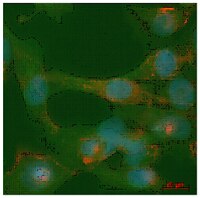Dystrophin and utrophin expression require sarcospan: loss of α7 integrin exacerbates a newly discovered muscle phenotype in sarcospan-null mice.
Marshall, JL; Chou, E; Oh, J; Kwok, A; Burkin, DJ; Crosbie-Watson, RH
Human molecular genetics
21
4378-93
2012
Mostrar Resumo
Sarcospan (SSPN) is a core component of the major adhesion complexes in skeletal muscle, the dystrophin- and utrophin (Utr)-glycoprotein complexes (DGC and UGC). We performed a rigorous analysis of SSPN-null mice and discovered that loss of SSPN decreased DGC and UGC abundance, leading to impaired laminin-binding activity and susceptibility to eccentric contraction-induced injury in skeletal muscle. We show that loss of SSPN increased levels of α7β1 integrin. To genetically test whether integrin compensates for the loss of DGC and UGC function in SSPN-nulls, we generated mice lacking both SSPN and α7 integrin (DKO, double knockout). Muscle regeneration, sarcolemma integrity and fibrosis were exacerbated in DKO mice and were remarkably similar to muscle from Duchenne muscular dystrophy (DMD) patients, suggesting that secondary loss of integrin contributes significantly to pathogenesis. Expression of the DGC and UGC, laminin binding and Akt signaling were negatively impacted in DKO muscle, resulting in severely diminished specific force properties. We demonstrate that SSPN is a necessary component of dystrophin and Utr function and that SSPN modulation of integrin signaling is required for extracellular matrix attachment and muscle force development. | | 22798625
 |
Sarcospan-dependent Akt activation is required for utrophin expression and muscle regeneration.
Marshall, JL; Holmberg, J; Chou, E; Ocampo, AC; Oh, J; Lee, J; Peter, AK; Martin, PT; Crosbie-Watson, RH
The Journal of cell biology
197
1009-27
2012
Mostrar Resumo
Utrophin is normally confined to the neuromuscular junction (NMJ) in adult muscle and partially compensates for the loss of dystrophin in mdx mice. We show that Akt signaling and utrophin levels were diminished in sarcospan (SSPN)-deficient muscle. By creating several transgenic and knockout mice, we demonstrate that SSPN regulates Akt signaling to control utrophin expression. SSPN determined α-dystroglycan (α-DG) glycosylation by affecting levels of the NMJ-specific glycosyltransferase Galgt2. After cardiotoxin (CTX) injury, regenerating myofibers express utrophin and Galgt2-modified α-DG around the sarcolemma. SSPN-null mice displayed delayed differentiation after CTX injury caused by loss of utrophin and Akt signaling. Treatment of SSPN-null mice with viral Akt increased utrophin and restored muscle repair after injury, revealing an important role for the SSPN-Akt-utrophin signaling axis in regeneration. SSPN improved cell surface expression of utrophin by increasing transportation of utrophin and DG from endoplasmic reticulum/Golgi membranes. Our experiments reveal functions of utrophin in regeneration and new pathways that regulate utrophin expression at the cell surface. | Immunohistochemistry | 22734004
 |










